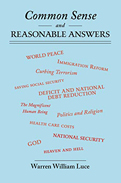
 |
In a book that examines life from many points of view, a retired military officer has delved into politics and religion, asking questions and coming up with startling but often sensible responses. The book as a whole seeks to examine in detail many major concepts that we think we should live by or have been conditioned to believe. The author then proceeds to pick these concepts apart, from branch to root, offering a different way of approaching such time-worn notions. The basic premise is that, despite what we have been led to believe, we can change the world, but we must do so by changing ourselves.
Luce begins by looking at the politics of the US as well as some from the rest of the globe. He makes the compelling statement that the word “politics” automatically has a negative connotation because of the way our politicians do or do not act. Yet we elect them, sharing the blame for their greedy get-and-spend tactics and self-protectionism. Americans love their country and most share similar views, so what is needed is a move toward removing politicians in favor of “patrioticians.” Luce asserts that we are taught that our country is in constant danger from terrorists, yet while there have been very few incursions from outside, American forces over the years have perpetrated terrorism in many ways all around the globe. Focusing in more sharply, there are issues such as the cost of health care, the economy, immigration, and jobs that need our intelligent attention, and for which solutions can be found, in taking better care of our health, for example, and calling for real enforcement of the E-verify regulations.
Thoughtfully and thoroughly exploring the world’s religions draws the author to the conclusion that there is a God, an overarching all-pervading spirit that would not have us hurt and kill one another but encourages us to look within for the happiness of life. Meanwhile, though, we should not allow ourselves to become complacent and enjoy our wealth when others are starving.
Luce’s book is well organized, beginning with the particular, such as politics and social ills, and leading toward the larger, more etheric qualities of life, including God and spiritual aspirations. Following his well-considered themes, many may find a kind of comfort in them, which was surely his intention. He invites us to understand war not simply as evil but as unnecessary, suggesting, for example, that the lives lost in many armed conflicts such as the conflict between the American colonies and Great Britain were a tragic waste since the conflict at hand could and almost certainly would ultimately have been solved with words. This sort of refreshing perspective, based in logic, and his many creative ideas can be a source of possible inspiration. Luce encourages us to search for truth and make sacrifices for the good of others. His well-conceived themes challenge us to ponder whether by simple determination, using our considerable mental powers, we might transform our hardened views and thereby affect others, and the whole world, in positive ways.
RECOMMENDED by the US Review